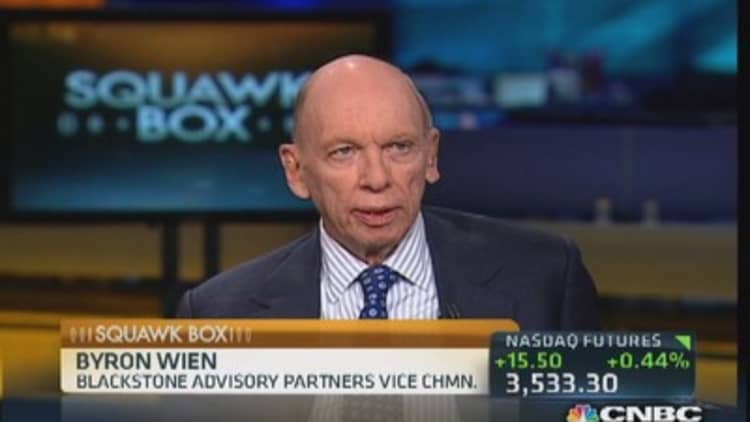
The stock market will be up 20 percent in 2014 but could experience a correction early in the year of as much as 10 percent, Byron Wien predicted in a CNBC interview on Tuesday—a day after releasing his annual Top 10 Market Surprises for 2014.
"This will be a 20 percent year," the vice chairman of Blackstone Advisory Partners emphasized on "Squawk Box."
In Wien's top prediction for 2014, he described stocks as a "Dickensian market," referring to "the best of times and the worst of times."
While the correction could be 10 percent early on, "the market will really pick up speed later on in the year when some of the negatives clarify," such as Obamacare glitches getting worked out and the political environment in Washington improving, he said.
Wien also said the U.S. economy will finally break out of the doldrums in 2014, with growth exceeding 3 percent—noting "it was picking up at year-end."
(Read more: Wien on 2014: More jobs, stronger US growth—and Obamacare that works)
In last year's predictions, Wien said the S&P 500 could see a correction from 2012 levels, before recovering to end the year "pretty flat." The S&P finished the year up 30 percent.
Wien readily admitted he missed the mark on stocks, but argued, "My view on the [2013] economy wasn't too far off. I thought the economy would grow at a very feeble rate."
"I thought profits would probably suffer. If you look at net income, it did suffer," he continued. "But because of share buybacks, profits were up about 4 percent for the S&P."
(Flashback: Wien's 2013 Market Surprises)
In a press release Monday, Wien announced his Market Surprises for 2014—a list he started the list back in 1986, when he was chief U.S. investment strategist at Morgan Stanley. Wien defines these predictions as having at least a 50 percent chance of happening.
- No. 10: The Affordable Care Act has a remarkable turnaround. The computer access problems are significantly diminished and younger people begin signing up. Obama's approval rating rises and, in the November elections, the Democrats not only retain control of the Senate, but even gain seats in the House.
- No. 9: The strength in the U.S. economy coupled with somewhat higher inflation causes the yield on the 10-year U.S. Treasury to rise to 4 percent. Short-term rates stay near zero, but the increase in intermediate-term yields has a negative impact on housing and a positive effect on the dollar.
- No. 8: The rising standard of living and the shift to more consumer-oriented economies in the emerging markets result in a reversal of the decline in agricultural commodity prices. Corn goes to $5.25 a bushel, wheat to $7.50 and soybeans to $16.00.
- No. 7: In spite of increased U.S. production the price of West Texas Intermediate crude exceeds $110. Demand from developing economies continues to outweigh conservation and reduced consumption in the developed world.
- No. 6: Emerging market investing continues to prove treacherous. Strong leadership and growth policies in Mexico and South Korea result in significant appreciation in their equities, but other emerging markets fail to follow their performance.
- No. 5: China's Third Plenum policies to rebalance the economy toward the consumer and away from a dependence on investment spending slow the growth rate to 6 percent in 2014. Chinese mainland traded equities have another disappointing year. The new leaders emphasize that their program is best for the country in the long run.
- No. 4: Shinzo Abe is the only world leader who understands that Dick Cheney was right when he said that deficits don't matter. He continues his aggressive fiscal and monetary expansion and the Nikkei 225 rises to 18,000 early in the year, but the increase in the sales tax, the aging population and declining work force finally begin to take their toll and the market suffers a sharp (20 percent) correction in the second half.
- No. 3: The strength of the U.S. economy relative to Europe and Japan allows the dollar to strengthen. It trades below $1.25 against the euro and buys 120 yen.
- No. 2: The U.S. economy finally breaks out of its doldrums. Growth exceeds 3 percent and the unemployment rate moves toward 6 percent. Fed tapering proves to be a non-event.
- No. 1: We experience a Dickensian market with the best of times and the worst of times. The worst comes first as geopolitical problems coupled with euphoric extremes lead to a sharp correction of more than 10 percent. The best then follows with a move to new highs as the Standard & Poor's 500 approaches a 20 percent total return by year end.
In his "also rans" of surprises that didn't quite make the actual list, Wien predicted that Hillary Clinton won't run for president in 2016.
"What forces her hand is the frustration of being president of the United States," he said with the caveat that he doesn't have a better than 50 percent conviction on it.
In another, he said tea party favorite Sen. Ted Cruz, R-Texas, will emerge as the clear frontrunner for the 2016 Republican presidential nomination.
"This is a very smart guy," Wien said. "I feel [Republicans] need somebody with star quality," saying if Cruz moderated his positions he'd be a viable candidate.
Wien said he thinks New Jersey Gov. Chris Christie and other GOP moderates will fade in popularity as momentum builds for fiscal and social conservative policies.
—By CNBC's Matthew J. Belvedere. Follow him on Twitter @Matt_SquawkCNBC.


